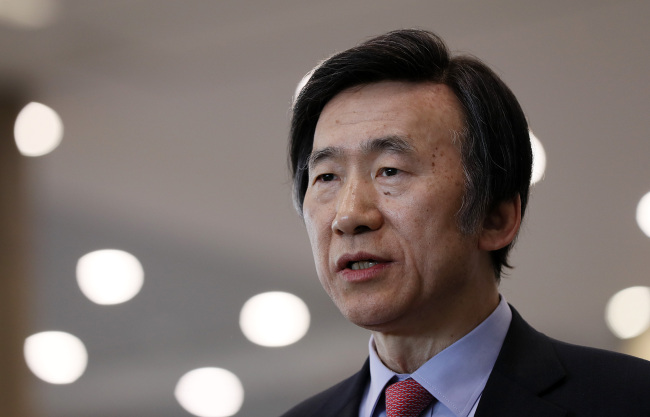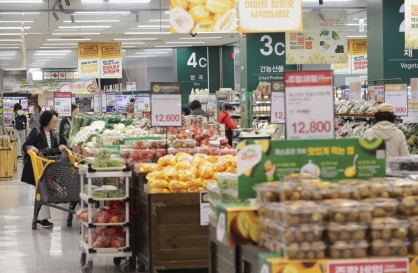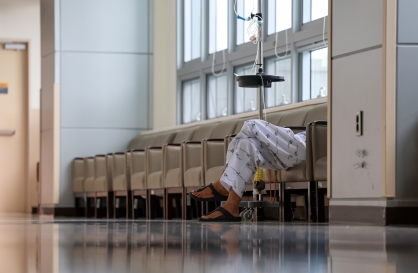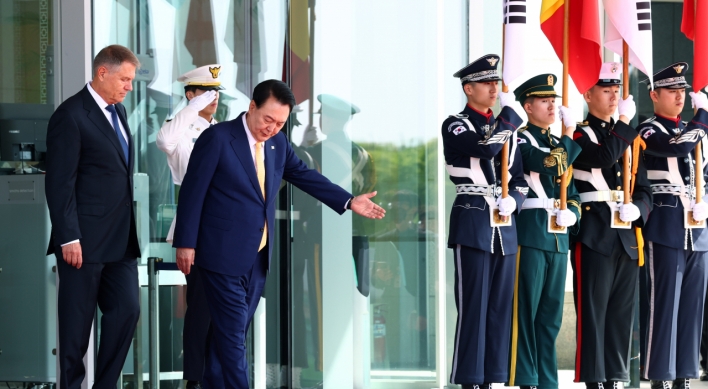China’s retaliation against THAAD may clash with WTO, FTA rules: foreign minister
By Yeo Jun-sukPublished : March 5, 2017 - 16:32
With China escalating economic retaliation on South Korea over a US-led missile defense system, Seoul’s foreign minister said on Sunday such Chinese moves may be in violation of the international trade laws and a bilateral trade pact.
Foreign Minister Yun Byung-se said that the measures taken by Beijing -- such as a ban on Chinese tourist groups from visiting South Korea – could constitute a violation of the World Trade Organization laws as well as the Korea-China Free Trade Agreement, which took effect in 2015.
Foreign Minister Yun Byung-se said that the measures taken by Beijing -- such as a ban on Chinese tourist groups from visiting South Korea – could constitute a violation of the World Trade Organization laws as well as the Korea-China Free Trade Agreement, which took effect in 2015.

“(China’s measures) could clash with WTO rules and relevant clauses of Korea-China FTA,” Yun said Sunday, appearing on state-run broadcaster KBS.
“It appears to me there has been such (retaliatory) measures, but Chinese authorities have officially denied it…I don’t think it is appropriate to place artificial obstacles to the bilateral exchange on a civilian level.”
During the meeting of G-20 foreign ministers last month, the minister told his Chinese counterpart Wang Yi that such a measure is in conflict with Beijing’s commitment to free trade and China should take “appropriate action” to address the concern, Yun said.
His remark came amid the reports that China has instructed its travel agents to stop selling tour packages to South Korea, in an apparent response to a land-swap deal last week between the Seoul government with retail conglomerate Lotte Group to host Terminal High Altitude Area Defense batteries here. China, which has opposed the missile system’s deployment in South Korea, has denied the report.
Given that there is no specific evidence -- such as official documents -- that shows the Chinese government delivered such an instruction, officials here noted that South Korea will face an uphill battle in winning legal disputes at international tribunals.
“We could consider taking it to the WTO in the light that we should raise the issue about what we are supposed to, but whether the action would help with resolving the dispute is another matter,” a Seoul official told The Korea Herald on the condition of anonymity due to the sensitivity of the matter.
Under the WTO dispute settlement system, a member state who wants to take a legal dispute must offer evidence that proves a violation is caused by another member state’s “explicit measure” before bringing the case to the settlement process.
But the Chinese authority has avoided appearing to issue direct retaliatory measures. Instead of delivering an outright ban on travel to South Korea, the Chinese tourism administration on Friday issued a notice that recommends its tourists choose their destination “with caution,” citing reports Chinese travelers were denied entry to Jeju island for holding incomplete travel documentation.
In the same interview, the foreign minister reiterated that the deployment of THAAD should be completed as soon as possible. The missile defense system is widely expected to be stationed on the peninsula as early as May.
“Installing THAAD at the earliest possible time will greatly help overcome a security crisis and guard against threats … (Seoul and Washington) share the notion that they will strive to complete it as soon as possible,” said Yun.
By Yeo Jun-suk (jasonyeo@heraldcorp.com)



![[AtoZ into Korean mind] Humor in Korea: Navigating the line between what's funny and not](http://res.heraldm.com/phpwas/restmb_idxmake.php?idx=644&simg=/content/image/2024/04/22/20240422050642_0.jpg&u=)




![[Herald Interview] Why Toss invited hackers to penetrate its system](http://res.heraldm.com/phpwas/restmb_idxmake.php?idx=644&simg=/content/image/2024/04/22/20240422050569_0.jpg&u=20240422150649)

![[Graphic News] 77% of young Koreans still financially dependent](http://res.heraldm.com/phpwas/restmb_idxmake.php?idx=644&simg=/content/image/2024/04/22/20240422050762_0.gif&u=)



![[Exclusive] Korean military set to ban iPhones over 'security' concerns](http://res.heraldm.com/phpwas/restmb_idxmake.php?idx=652&simg=/content/image/2024/04/23/20240423050599_0.jpg&u=)



